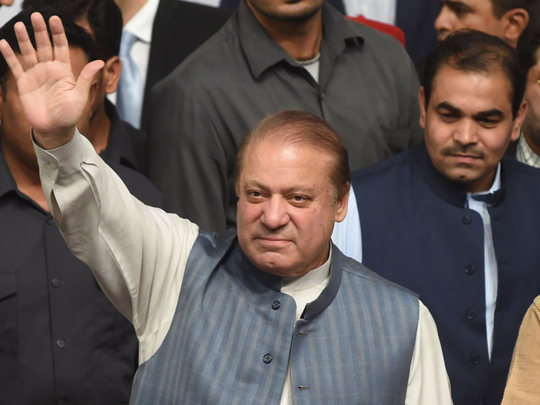
The past week saw Pakistan’s top ruling party renew its support for former prime minister Nawaz Sharif, in a way that clearly made a mockery of democratic values anywhere on the face of this earth. In the process, the ruling regime in Islamabad led by Pakistan Muslim League-Nawaz (PML-N) has effectively become “a lost government” with little to show in terms of direction.
Sharif’s well-orchestrated return as president of the PML-N, following his party’s push in parliament to enact a new law that would allow disqualified heads of political parties to continue in office — even if their membership of parliament ended abruptly through a court order. Sharif’s downfall began more than a year ago when three of his children were found to hold large-scale offshore properties in central London as details of the so-called ‘Panama leaks’ unfolded. In any other stable democracy, a decisive verdict of the kind issued by the Supreme Court, which led to Sharif’s dismissal in late July, would have sealed his fate. But that’s not how Pakistan works. That is why Sharif continues to publicly repeat the question: “Mujhey kyun nikala”? (Why was I thrown out?)
Meanwhile, in the past week, Interior Minister Ahsan Iqbal angrily reacted when stopped at the front gate of a special court dedicated to hearing cases of corruption. Shortly before Sharif’s appearance at the same court, Iqbal roared before journalists and TV cameras, promising to defy the “two centres of authority” and assert the civilian government’s authority.
Iqbal’s remarks were a clear and a pointed reference to Pakistan Army — the institution that has been increasingly targeted by PML-N leaders for allegedly instigating the former prime minister’s downfall. Notwithstanding the obvious fact that there has been no verifiable evidence of the army’s involvement and Sharif’s downfall was caused by a Supreme Court verdict, his coterie of hardcore followers, including cabinet ministers, simply refuse to acknowledge that stark reality. And the build-up to next years’ parliamentary elections already promises to become a non-event. Though the country’s political parties have entered the fray at top speed, the exercise will largely remain irrelevant for ordinary folks. In the absence of a renewed commitment to the establishment of a credible path to reforming Pakistan, periodic elections hardly matter.
The PML-N’s defiance of the case against Sharif is symptomatic of a wider malaise. As Pakistan’s democracy evolved in the past decade after General Pervez Musharraf, the last military ruler, was forced out, political parties have hardly progressed to become more representative. It is therefore not surprising that a party like the PML-N has done little towards democratising Pakistan, though its position in electoral politics remains intact.
Some of the consequences of the failure of political parties to become more representative are much too glaring to be ignored. For instance, the very fact that vital areas like reforming the educational system across the country has not even received adequate lip service, says much about the priorities of those who lead political parties.
A similar fate has surrounded the matter of the state-provided health-care system. The pathetic conditions across government-owned and run hospitals has clearly unmasked an all too obvious reality — that the ruling political elites neither have time nor the inclination to reform key social services in the interest of the people. Except for Imran Khan, the former cricket star-turned-politician who heads the Pakistan Tehreek-i-Insaaf (PTI) party and who oversaw the establishment of the Lahore-based Shaukat Khanum cancer hospital, none of the other politicians can claim credit to a similarly prominent venture.
The sad reality surrounding today’s Pakistan is indeed multifaceted though it extends itself in just one obvious form — that the country’s ruling structure leads a practically dysfunctional state. Clearly, for the Muslim world’s only country armed with nuclear weapons, this is no way to go.
And much of the ‘fix-Pakistan’ operation will also have to reverse a good part of Sharif’s legacy as prime minister. For ordinary folks, the country’s economic direction is indeed alarming at best. Under controversial former finance minister Ishaq Dar, Pakistan has witnessed one of the worst widening of the gap between the rich and the poor.
As the once most powerful figure in the Cabinet, second only to Sharif, Dar oversaw initiatives that were undertaken in the name of development, but carried little significance for the common people. In a country where at least one-third of the population lives in extreme poverty, it’s nothing short of criminal neglect to have an air-conditioned bus service or high-speed motorways gain prominence over the national development agenda.
The writing on the wall is just too glaring to be ignored. Sharif’s clash with the Supreme Court and the Army (and it is a very public and visible clash in view of his explicit or implicit criticism of the two) will neither return him as prime minister nor strengthen Pakistan’s democratic values. And his followers like Ahsan Iqbal, whose latest utterance was meant to target the Army, has only vitiated the civil-military working atmosphere.
Pakistan lives with a range of risks. A country that has lived for almost half of its 70 years of existence under the military’s rule, the present-day democratic framework needs to be nurtured and strengthened. Tragically, however, Sharif and his followers just don’t get it.
Farhan Bokhari is a Pakistan-based commentator who writes on political and economic matters.











